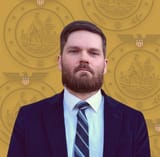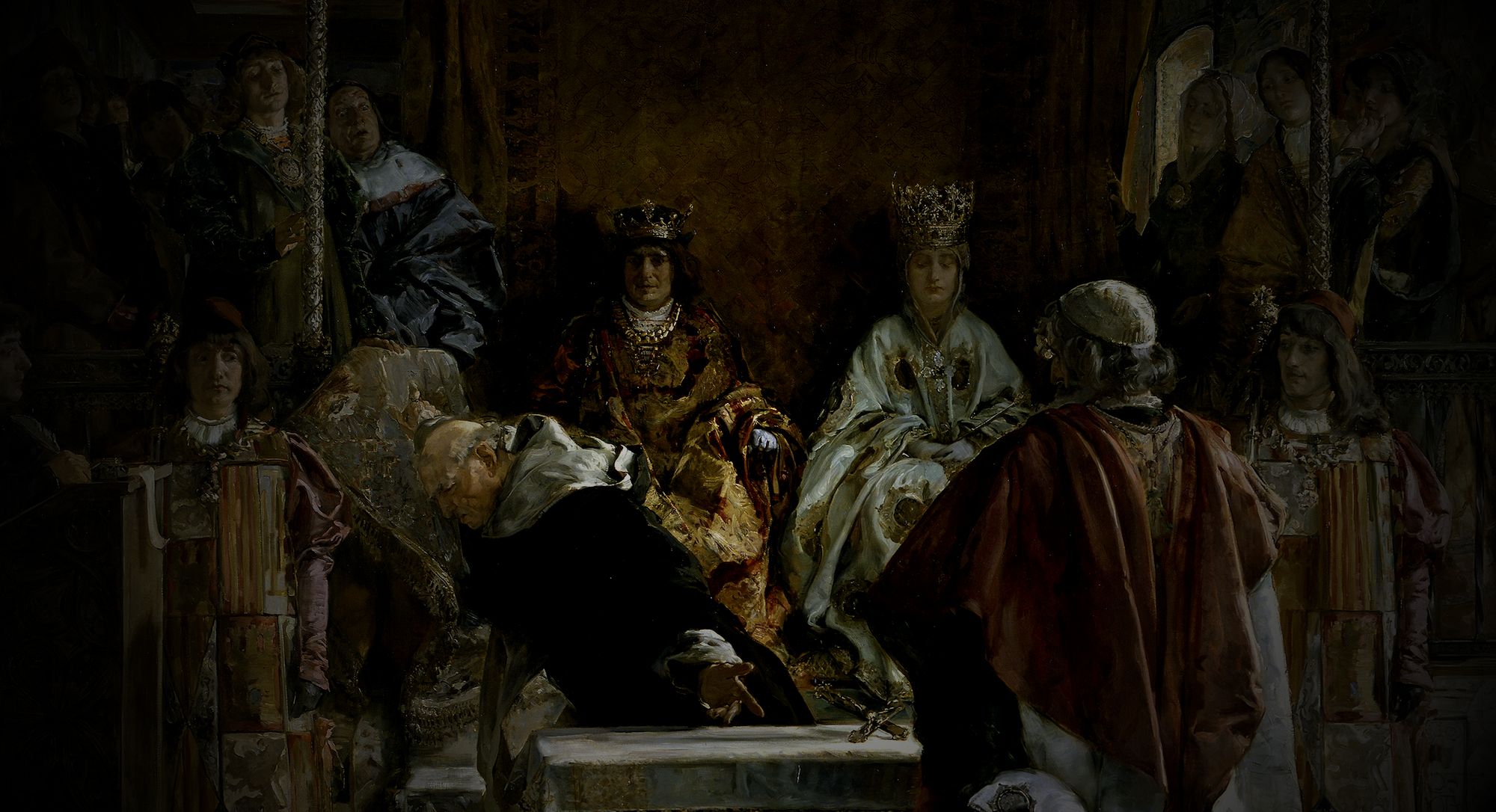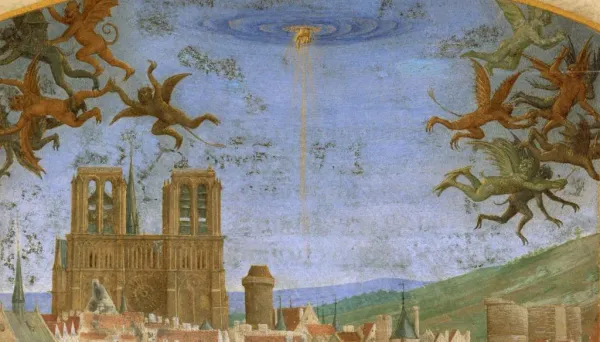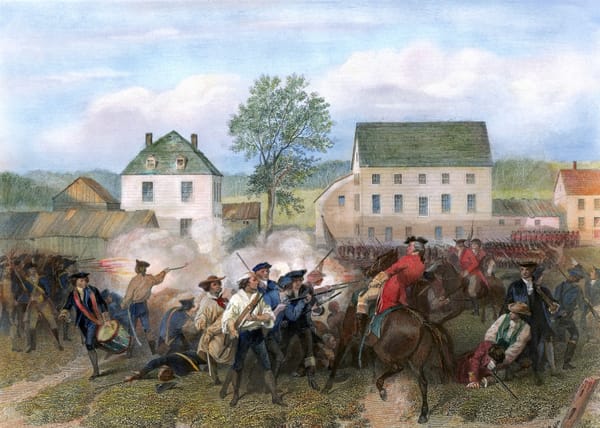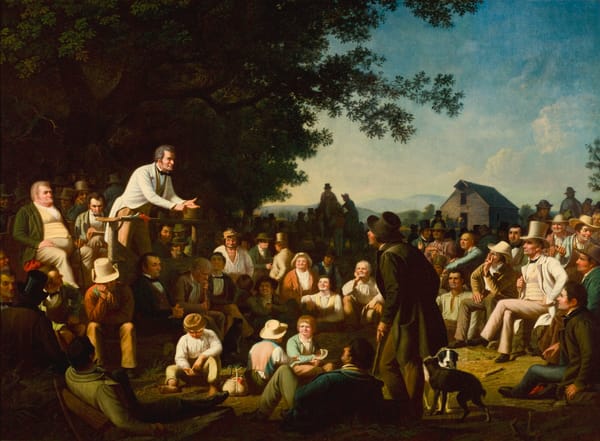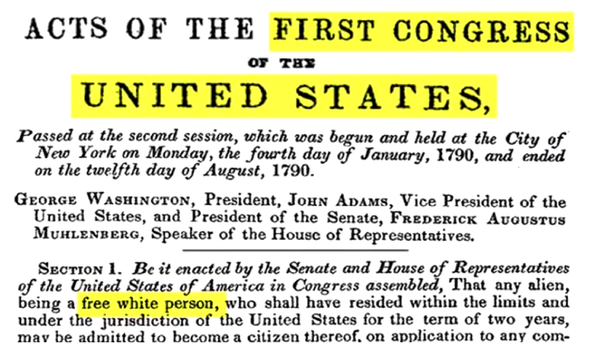The Eclipse of a Christian Nation: Reclaiming American Destiny from Judaic Declension
Christian America must reclaim what is hers.
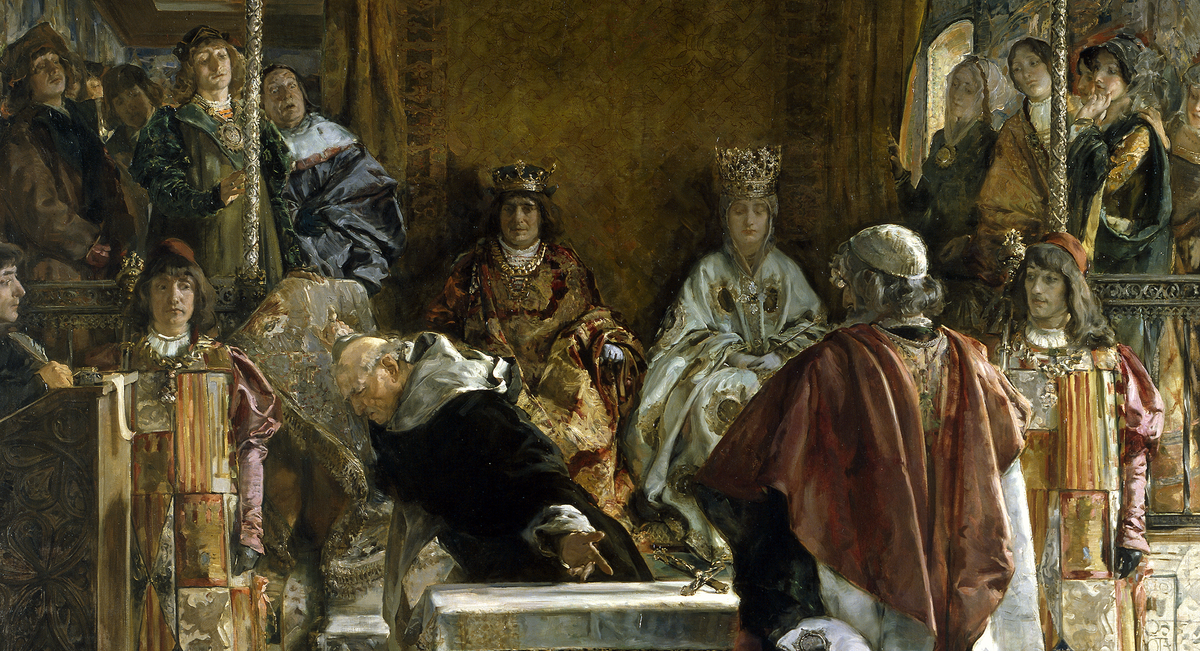
Jon Harris’s recent article at American Reformer offers a meticulous chronicle of the theological and historical currents that have tethered American Christianity to the modern state of Israel. Yet, like a priest describing defilement without naming the idol, Harris skirts the heart of the matter: America, a nation forged as a White Christian commonwealth, has been ensnared by a foreign agenda that saps her sovereignty, drains her treasury, and perverts her sacred calling.
Jon’s appeal for “Solomon’s wisdom” in navigating this “complex” issue is a tepid evasion, a refusal to own the stark reality that a nation dispossessed of her identity and destiny cannot flourish. What we face is not merely a question of policy or eschatology; it is a crisis of national existence, a betrayal of the vital ties that bind America to her Christian vocation. To restore our nation, we must cast off the yoke of alien influence, reject the dispensationalist fantasies that cloud our pulpits, and reassert the primacy of a Christian order rooted in the blood, soil, and spirit of our people.
Theological Roots of Betrayal and Capitulation
Harris traces the roots of Christian Zionism to Anglo-Protestant theology, from Bucer and Beza’s reinterpretation of Romans 11 to Cromwell’s Whitehall Conference in 1655, which readmitted Jews to England as a step toward their restoration to Palestine. He notes the convergence of English Restorationism and German Pietist evangelism, culminating in the 19th-century Zionist movement. This history is accurate but incomplete, for it omits the deeper dynamic: the gradual subordination of Christian nations to forces that exploit their charity while undermining their cohesion.
The Protestant vision of a Jewish return was not a blank check for foreign dominion. Some early reformers saw the restoration of Jews as a divine act, not a mandate for Christians to subsidize a secular state. Still, the Bucer-Beza reading of Romans 11 marked a real shift from other Reformed theologians, including Calvin, and from the broader Christendom consensus. Henry Bullinger, author of the Second Helvetic Confession—the most widely embraced confession of the Reformation era—explicitly condemned similar notions, branding them the “Jewish dreams” of Anabaptists.
The Puritan divines who shaped England’s and later America’s ethno-covenantal identity understood the nation as a corporate body, bound by faith and kin, tasked with upholding God’s law. Their support for Jewish restoration (to the extent that it existed) was primarily eschatological, not geopolitical, and certainly not a license for external powers to dominate one’s own nation or dictate its policy.
In time, the Balfour Declaration (1917) and the establishment of Israel (1948) transformed a speculative theology into a political program of alleged world-historical significance. At the heart of this crisis lay a theological distortion: dispensationalism’s elevation of ethnic Israel above the church and the nation. Harris acknowledges that not all Christian Zionists are dispensationalists, but this misses the broader point: dispensationalism has reshaped the American Christian imagination, diverting us from our particularist, ethno-covenantal roots. The Puritan vision of America as a “city on a hill” has been supplanted by the internationalist ideal of America as a “boot on the earth” preoccupied with a foreign land and people.
Dispensationalism’s error is twofold. First, it severs promise from fulfillment, reading Scripture carnally rather than spiritually, and thereby fractures the unity of God’s redemptive plan. Second, it breeds passivity: teaching believers to await the rapture rather than to labor for a godly commonwealth. Thus paralyzed with apocalyptic allure, the church has become spectator and accomplice to its own decline—further disarmed by the liberal mythos that equates ethnic loyalty with sin and renders Christian nations defenseless before alien influence and infiltration. This is not theology; it is capitulation.
This capitulation was no accident. It was cultivated. Figures like Samuel Untermyer—a Jewish-Zionist financier—bankrolled Cyrus Scofield’s Reference Bible and its dispensationalist doctrines in the early 20th century. Through this, Zionist sympathies were embedded in the American mind as a divine imperative which admits of no deviation. What appeared as theological innovation proved a strategic instrument: channeling Christian fervor into service of a foreign cause and reshaping both American faith and polity to serve external ends. Hermeneutical novelty became a geopolitical engine.
Historic Christian Ethnopolitics and American Destiny
The political wisdom of our forebears offers a definite counterpoint. In the late 16th and early 17th centuries, political theorists like Bartholomew Keckermann and Franco Burgersdijk articulated a vision of Christian politics that guarded against precisely such encroachments. In his System of Political Discipline, Keckermann warned that Jews were not easily to be admitted into the kingdom; if admitted, were to be constrained by general and special statutes—peaceable conduct, bans on mixed marriages, controls on usury and illicit contracts, exclusion from public offices, synagogues only by leave, distinctive dress, local-magistrate jurisdiction, prohibitions on blasphemy and on corrupting Christian youth, and protections for converts to Christianity. Burgersdijk echoed this in his briefer work, The Concept of Economic and Political Doctrine.
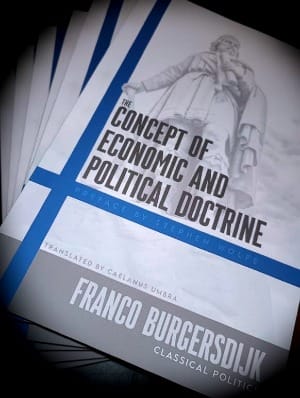
The Concept of Economic and Political Doctrine
In this classical politics primer, a 17th c. Dutch Reformed scholar and philosopher parses through economics (household life) and politics with clarity, brevity, and precision. Preface by Stephen Wolfe.
Likewise, the Dutch theologian Gisbertus Voetius, a towering figure of 17th-century Reformed orthodoxy, articulated a similar vision in his Disputations. He noted that the infamous vices of the Jews—fraud, greed, plunder, usury, injustice, and calumny—by which the Jews “incessantly attack Christians,” are hidden from no man except he “who has never seen Jews or never heard anyone tell him what a Jew is.” He scorned them as miserable slaves of avarice, lust, gluttony, pride, lies, hatred, envy, and revenge. And he warned against various political means: granting them civil rights, free association with Christians, places of prominence in society, and the public exercise of their religion, among other things.
These were not the ravings of malicious bigots but the prudent counsel of Western statesmen safeguarding the res publica against those whose loyalties (both ethnic and religious) lay elsewhere—thus ensuring the commonwealth’s moral and spiritual integrity. This policy reflected the wider practice of historic Christendom. From the Fourth Lateran Council’s mandates of distinctive garb and geographic segregation to medieval expulsions and Venice’s Ghetto Nuovo, Euro-Christian civilization and her polities—from which America naturally descends—restricted integration to maintain the realm’s religious and ethnic character. What we have now is a bizarre reversal, where Western power is “piously” open to Jewish ends.
Harris’s narrative glosses over this, as if the Reformation erased such wisdom overnight. But later testimony confirmed the rationale. Carl Friedrich Heman, a German Jewish Protestant, argued that only those shedding Talmudic contempt for Gentiles could integrate peaceably; otherwise, a self-enclosed mindset tended toward exploitation without attachment to host identity and institutions. As Thomas Cyr has framed it, the Jews are an ethno-sectarian people; this fosters an antipathy in other peoples which is too often mistaken for baseless persecution. Heman concluded that Christianity remains the surest defense of nationality—as seen in Spain’s experience and Germany’s need to resist judaization through firm Christian commitment. In the light of Heman’s candor as one who had crossed the divide, the traditional restrictions appear as political realism, not malice.
This ethno-religious antithesis has long been observed. In the 4th century, John Chrysostom decried Jewish influence as a threat to Christian souls. Centuries later, Maurice Samuel openly described an “irreconcilable difference” between Jewish and Gentile identities. American instinct reflected a similar wariness: the 19th-century Know Nothing Party opposed unchecked immigration to protect the Anglo-Saxon Christian identity of the republic, and, into the early 20th century, the Senates of Virginia, North Carolina, and South Carolina all enshrined laws of similar measure—an expression of wholesome prejudice in defense of church and nation.
America’s founding materials echo the same particularist vigilance. William Bradford’s Of Plymouth Plantation and the Mayflower Compact cast the colonial venture as a covenant undertaken “for the Glory of God” and the common good under God. New England Congregationalists framed their polity with explicit ethno-religious continuity—“we who are by nature Englishmen…”—affirming doctrinal and national inheritance together. And George Washington’s Farewell Address joined the two pillars—religion and morality—as indispensable to political prosperity while warning (quite presciently) against foreign entanglements that corrode national virtue. In sum, the American inheritance drew on Christendom’s settled wisdom: a people bound by faith and kin must order its common life to guard its identity, independence, and destiny.
The Melting Pot of Judaic Declension
The “melting pot” theory of America, coined by the Jewish man and new world order enthusiast Israel Zangwill, was less a description of historic American identity than a confession of Jewish intent: during the 20th century, Jews in all corners of society undertook a campaign of ethno-cultural dilution, departicularizing and thereby radically recasting the American inheritance, an effort we might call Judaic Declension. Laws, sentiment, history, culture, mores, demographics, policy, and more—all these were cumulatively refactored. This section will address this in particular, with details, though not comprehensively.
Harris notes that some Jews historically opposed Zionism, from rabbis fearing assimilation to secular leaders like Lucien Wolfe. But this resistance faded after 1948. As Podhoretz notes, Israel’s establishment united nearly all Jews. And by the post-1967 era, support surged, with Israel becoming the “religion” of American Jews, who confessed their newfound faith through lobbying, demonstrations, contributions, and voting.
Jewish-Marxist radicals of the Frankfurt School, including Theodor Adorno and Max Horkheimer, recast Western homogeneity and Christian norms as psychological maladies, fostering a spirit of self-loathing. Sigmund Freud’s psychoanalytic revolution deepened this subversion by pathologizing traditional moral order and destabilizing the family. This Jewish “culture of critique” infiltrated academia, law, and media, exalting radical individualism and pluralism while eroding Christian cohesion. By turning inherited identity into a sickness, it prepared America for external capture.
After World War II, the “Jewish Golden Age” emerged, fortified by the Holocaust narrative and Vatican II’s Nostra Aetate (1962–1965), which, influenced by Jewish historians like Jules Isaac, condemned antisemitism and promoted Jewish-Christian dialogue. Through cultural vehicles—things like the Diary of Anne Frank, the Eichmann trial, and Hollywood’s dramatizations—Holocaust memory became a lucrative political industry. It recast America as a pluralist creed rather than a particular nation, undermining her White Christian foundations. Jewish-led intellectual and political movements, joined later by neoconservatives such as Leo Strauss, elevated guilt, anti-Nazism, and judeocentricity into a new civil religion, securing Jewish influence while disarming national resistance.
Harris omits mention of Jews in American anthropology. The field of indigenous Indian studies unmistakably bears their imprint, forged by anthropologists like Franz Boas (conceptual founder of the “race as a social construct” myth) and his disciples—Edward Sapir, Paul Radin, Sol Tax, Leslie Spier, Ruth Leah Bunzel, Edgar Siskin, and Melville Jacobs. Rooted in their ambiguous status as “European” Jewish intellectuals, these thinkers deliberately ignored inconvenient facts about the Indians and instead crafted an explicitly anti-racist science that, ironically, sought to preserve and celebrate Indian cultures, languages, and religions. This was a far cry from the work of real American scholarship, like that of Archibald Loudon, who meticulously documented the wars and outrages committed by the Indians against what he unashamedly called “White people.”
This Jewish-led Indian-advocacy was a form of ventriloquism, reflecting Jewish predicaments—fleeing “persecution” and seeking “inclusion”—while minimizing their ethnic identity in professional life, despite strong personal ties to Jewish causes, such as Jacobs’ work with the ADL and YIVO. Simultaneously, their work had the effect of subverting White American heritage, portraying it as a monolithic oppressor devoid of redemptive value, a narrative that undermines the White and Christian foundations of the nation, laid, at times in blood, certainly in suffering, often at the hands of Indians. This dual advocate-alienate agenda—pursued by a cohort that married within Jewish circles and engaged in Jewish political action—reveals a strategic wresting of anthropology to align with Jewish interests against American inheritance.
Harris cites AIPAC’s $279 million in political spending (2016–2024) yet softens its significance. The American Israel Public Affairs Committee and allied PACs do more than lobby; they operate as a system of control, binding politicians, media, and even churches to Israeli objectives. Other foreign lobbies—Chinese, Qatari—face FARA scrutiny, but Israel’s network, structured as domestic PACs, evades such oversight by design.
The evangelical surge of pro-Israel sentiment after the 1967 war, which Harris attributes to spiritual enthusiasm and Cold War logic, was in fact orchestrated. As Daniel Hummel documents, Israeli officials and the American Jewish Committee cultivated figures like Billy Graham and W. A. Criswell. Graham’s 1968 AJC-brokered meeting with Jewish leaders, his daughter’s service on an Israeli moshav, and Graham’s film His Land (1970)—co-sponsored by the AJC and accompanied by church study guides—turned prophecy into propaganda. Criswell, then Southern Baptist Convention president, met Golda Meir and Israeli ministers during a 1968 state-sponsored tour that birthed projects such as the Baptist Forest, publicly financed by evangelicals to signify loyalty.
Harris omits the Jewish neoconservative dimension. Men like Irving Kristol, who advocated U.S. defense of so-called “democratic” nations like Israel as an ideological imperative, and Norman Podhoretz, who opposed Soviet totalitarianism and pushed for a robust U.S. military to ensure Israel’s survival against Russian-backed threats, helped reshape our foreign policy to prioritize Israel’s security over American nationalism. The result is a Christian populace conditioned to see Israel’s interests as synonymous with their own, even as their nation’s borders crumble and its moral fabric unravels.
This dynamic reflects a deeper truth: power abhors a vacuum. When a nation’s elite—its pastors, politicians, and intellectuals—cease to guard the common good, external forces fill the void. The “Judeo-Christian” idiom, now a conservative cliché, masks surrender—America’s White Christian identity subordinated to a secular state that champions abortion, LGBTQ ideology, and hostility to Christ. To hail Israel as a “democracy” is to ignore its divergence from the Christian political order America once aspired to embody.
Recent machinations reveal the depth of this capture. In 2025, amid the protracted Ukraine war, talk of a “Greater Israel” resurfaced: Israeli interests entwined with Kyiv’s defense, and President Zelenskyy envisioned a “big Israel” model—militarized, surveilled, and ethnically fortified. Reports noted 80–100 percent of Ukrainian MPs hold Israeli passports. Behind Israel’s declared neutrality lay covert involvement—Netanyahu’s shuttle diplomacy, arms-technology transfers, and cautious avoidance of Russian reprisal in Syria—all serving an expansive vision of Judaic Lebensraum from the Nile to the Euphrates, pulling America deeper into Eurasian entanglements.
Netanyahu’s September 2025 UN visit underscored the strategy. In a New York roundtable he called social media Israel’s “most important weapon,” admitting influencer payments up to $7,000 per post under the Esther Project, which fill TikTok and X with undisclosed propaganda. His pressure on Elon Musk signals an effort to redraw the Overton window. Meanwhile, David Ellison’s $150 million purchase of Bari Weiss’s The Free Press and her elevation to CBS News editor-in-chief consolidated a pro-Israel media bloc. The lingering Epstein scandal—with allegations of Mossad entanglement—illustrates the same pattern: compromised elites serving foreign ends. These converging operations amount to cultural conquest, not coincidence.
Harris’s account of U.S.-Israel relations reveals a nation ensnared by its own generosity. The annual $3.8 billion aid package, UN cover, and Middle-East interventions drain a nation already crippled by debt and social fragmentation. The supposed strategic logic—shared threats like Iran—has instead multiplied enemies, not security. Israel’s pushes and provocations drew America into the 1982 Lebanon invasion, the 2003 Iraq war (engineered by Paul Wolfowitz, Richard Perle, and other Jewish neoconservatives), and a chain of proxy fights that cost over $6 trillion and destabilized the region.
The pattern endures. In June 2025, Israel’s Twelve-Day War struck Iranian nuclear sites and bases, killing over 1,000 and prompting U.S. airstrikes on three Iranian facilities. Netanyahu framed it as averting nuclear Iran, yet it risked a regional inferno as Houthis and Iranian proxies have retaliated against U.S. assets. In Gaza, Israel’s continuing campaign—denounced by UN experts and Amnesty International as genocide, with 66,000 dead by October 2025 and deliberate devastation of infrastructure—has further shredded its moral standing and exposed America’s complicity.
The deeper issue is one of sovereignty. A nation that cannot say “no” to a foreign ally is not free. When Senator Ted Cruz boasts of being Israel’s “leading defender” in Congress, he exemplifies a ruling class whose loyalties have drifted from its own people. Neoconservatives who purged Buchanan’s America-first faction in the 1990s paved this road, aligning the Right with Zionist priorities. The pattern repeats with Doug Wilson—an aspiring “Buckley” adjacent to the New Christian Right—whose opportunism, racial equivocations, theocratic-libertarian shapeshifting, and participation in Yoram Hazony’s National Conservatism project signal a new phase of co-optation. His assurance that Jews will “flourish” under Christian nationalism reveals subversion masquerading as synthesis.
Thus Harris’s chronicle, though accurate in detail, fails in interpretation and framing. The story of dispensationalism and Christian Zionism, as well as American and Jewish-Israeli relations, is not a tale of misguided charity but of managed decline and dependence—a theological, cultural, and political capture that has turned our once-sovereign Christian nation into a tributary of a foreign power.
Courage to Name the Crisis, Renew the Nation, and Restore Her Soul
The evidence compels a singular conclusion, if we will only name it: we, in America and the broader West, have a Jewish problem. To acknowledge this is not animus but fidelity to truth. The modern weaponization of “antisemitism” serves to suppress any due examination of Jewish-Israeli influence or of the deeper conflict between Jewish and Christian worldviews—a “trick” admitted even by Jews themselves. To critique Jewish-Israeli power or Zionist subversion is not evil; it is the defense of national integrity and of the Christian inheritance bequeathed by our fathers. The true evil lies in demanding that one people abandon its destiny for another’s.
This enduring tension—between Jews and the nations, between particular and particular—has been recognized for centuries. The insights of Carl Heman and Maurice Samuel cut through illusion: the friction arises from irreconcilable nature and identity. Besides, the “Second Jewish Question” is already on the table, revived in our age by voices such as Pete Quinones and Darryl Cooper; it rearticulates what countless thinkers throughout Christendom have known, and what millions more today are learning throughout the rising West: this collision, if unacknowledged and unattended, leads inexorably to ruin. To deny this is to deny history itself.
The moral arguments advanced for Israel—Holocaust guilt, democratic kinship, self-preservation—are hollow. Harris cites Nixon, Scholz, and Macron portraying Israel as a bastion of liberal democracy; but the record is otherwise. Nixon himself confessed privately to Billy Graham in 1972: “This stranglehold [of the Jews upon everything] must be broken or this country is going down the drain.” Nor can Israel claim divine favor or Christian affinity while it celebrates secularism, advances abortion and sodomy, despises Christ, and wages a genocidal campaign in Gaza. Its creed is not the Cross but Auschwitz—an inversion that turns guilt into an instrument of domination and demands perpetual atonement from the nations it exploits.
America’s moral duty lies not in subsidizing a foreign state but in serving her own people. Our nation is not an abstraction but a concrete reality: a people bound by faith, history, and kin, commissioned to preserve, enrich, and bequeath the American inheritance. Every dollar sent to Israel is a dollar not spent on our schools, our drug- and crime-ravaged towns, or our collapsing borders and demographics. Every soldier deployed to the Middle East is a son withheld from defending the homeland amid demographic war; every politician pledging fealty to Israel betrays his solemn charge; and every clergyman parroting the heresy of Zionism plays puppet to an alien god. Charity begins at home, and a nation that abandons her own while serving another betrays both nature and grace. Washington’s admonition remains timeless: religion and morality are the twin supports, without which neither patriotism nor the nation can stand.
This fidelity to our own is not insularity but the sacred axiom of a healthy nation. The antidote to our captivity lies in the reawakening of our politics and faith: a nation confident in her divine vocation as an ethno-religious organism under God’s law, charged with the stewardship of all that is her own. Our Christendom forebears understood this: their charters, sermons, and statutes bound faith to blood and blood to duty, warning of the peculiar dangers posed by unrestrained Jewish influence and foreign dominion. America stands again at that ancient crossroads.
To break free from this bondage requires positive clarity and disciplined action. In other words: vision and pain. Bradford’s words ring eternal: “All great and honorable actions are accompanied with great difficulties, and both must be enterprised and overcome with answerable courage.” Renewal demands a fourfold strategy—racial consciousness, theological reformation, political disentanglement, and cultural restoration.
- Racial Consciousness: America must recover a particularist identity rooted in the White Christian heritage that founded and built the country. Exclusion is not cruelty but prudence. The 19th-century Know Nothing Party opposed unchecked immigration precisely to preserve this unity; the Virginia Senate declared in 1906 that “upon Anglo-Saxon supremacy depends the future welfare and prosperity of the commonwealth.” Such recognition of ethno-religious integrity must return if America is to resist dissolution and reassert her continuity as a Christian nation.
- Theological Reformation: The church must expunge dispensationalism and restore covenantal theology. Pastors must preach the unity of God’s redemptive plan—that Christ and his church, not a secular state, constitute the true Israel. Seminaries must train men to build communities governed by God’s law rather than by foreign eschatologies and social dogma. Christians must abandon apocalyptic fatalism and embrace dominion: constructive labor for a godly society. Grace must no longer be pitted against nature. We must discard the twin liberal heresies of egalitarianism and anti-racism, which nullify ethno-religious order by denying that peoples and nations have distinct callings under God.
- Political Disentanglement: America must sever her unconditional allegiance to Israel. Sovereignty requires saying “no.” Congress should audit and curtail foreign aid, redirecting resources to domestic restoration. Officials who subordinate national interest to foreign lobbies must face exposure and removal. The influence of pro-Israel PACs must be countered through elite and popular organization alike. This is not isolationism but stewardship: a nation that cannot govern itself cannot govern others. We must reveal the truth of the Greater Israel project in Ukraine, the Twelve-Day War’s fallout, the Iraq War’s neocon genesis, the Gaza genocide, the attack upon the USS Liberty, and all elements of Jewish-Israeli chicanery; and we must expose the influencer bribes and media consolidations and manipulations that distort public discourse.
- Cultural Restoration: This Christian nation must rediscover its identity as a people set apart. Education must teach history, not as a litany of guilt but as a saga of divine providence animated by piety and heroism which instills pride in America’s Christian heritage. We must reject the “Judeo-Christian” myth that dilutes our distinct identity, and instead cultivate a distinct Euro-Christian ethic and aesthetic: social customs, laws, art, architecture, dress, and language. Communities must rebuild solidarity, through shared worship, shared fellowship, and shared labor, rejecting the atomizing consumerism of modernity. Against Ellison and Weiss’s media empire, we must forge institutions that speak with our own voice and embody our own truth.
Critics will argue that this vision risks alienating allies, destabilizing the Middle East, or reviving old hatreds. They may also contend: “What about the complicity of Whites in these things?” These objections merit response:
- Alienating Allies: A recalibrated relationship with Israel does not mean abandonment. Diplomacy can continue, but always from an America-first basis. Israel’s military strength ensures its survival; America’s withdrawal of indulgent aid would force it to stand on its own, fostering mutual respect.
- Destabilizing the Region: The Middle East’s chaos predates our restraint and has been aggravated by our Zionist entanglements—from Iraq to Iran to Gaza. By withdrawing, America regains strategic clarity and domestic focus.
- Reviving Hatreds: The charge of antisemitism is a reflex of liberalism’s judeopathy. This vision seeks not scapegoats but honesty and sovereignty: recognition of and liberation from all alien influence, be it Israeli, Chinese, or Qatari. It also seeks continuity; as our Christian and American fathers counseled: independence requires vigilance and limit.
- White Complicity: It is true that some Whites have, through cowardice or corruption, abandoned their God-ordained duty to guard the national order. Their embrace of such things reflects a betrayal of kin and faith. Yet this complicity does not absolve the external forces that exploit this weakness. Neither is this representative of our wider, historic identity and nature; indeed it is both anomaly from and abuse of the Euro-Christian ethos.
The crisis we face is not merely geopolitical but existential. America was founded as a Christian nation. That identity—our national soul—is dissolving under the globalist creed of guilt, equality, and endless atonement. The evangelical fixation on Israel is but one symptom of this disease: a church that has lost its prophetic authority and a nation that has forgotten itself. The liberal mythos conceals the predation: Netanyahu’s $7,000 influencer brigades, Ellison’s consolidated propaganda empire, the Greater Israel shadow cast over Ukraine’s plains, the pervasive judeopathy and genophobia that paralyze the West. These are not isolated phenomena but signs of a psycho-civilizational captivity.
To recover our prophetic voice and our American identity, we must reject the dispensational mirage and every pretense of Jewdom over Christendom. We must will ourselves as stewards of a particular Euro-Christian nation with a particular calling under God. This is not retreat but advance—the rebuilding of Christendom within our own borders, where faith informs law, kin strengthens community, and sovereignty is sacred. A New World Order; if need be, the lone bulwark of Western eudemony. Otherwise we perish: bled of wealth, emptied of will, our churches reduced to chorus lines for a secular anti-Christ state. The alternative to renewal is nightmare—a world-historical inversion in which the scepter of Christendom is traded for servitude to its nemesis.
Therefore, America must summon the courage of her fathers. The call for “Solomon’s wisdom” cannot suffice; wisdom without will is cowardice. The hour demands Bradford’s faith and Washington’s firmness—a resolve to reclaim our destiny as the foremost White Christian nation in a decreasingly White Christian world. Let the church cast off dispensational chains; let the nation reject foreign entanglement and the liberal myth that surrender is piety; let the people renew their covenant with the God of their fathers—the men who conquered and cultivated this land as sacred inheritance, not to be defiled but to be guarded. The hour is late, yet dawn remains possible. Let us seize it.
ATTENTION READER: We need your help.
Institutional trust is at record lows. But without institutions, we cannot renew our people, much less provide an inheritance to posterity. In response to this crisis and as an organic outgrowth both of necessity and natural interest, American Mantle exists. And so we make our appeal.
Donate to the Cause. Help us reach our monthly goal in order to solidify this crucial institution.

